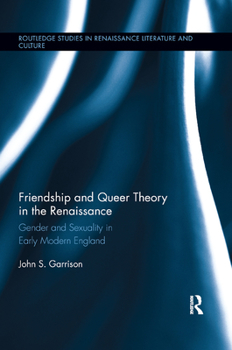Friendship and Queer Theory in the Renaissance: Gender and Sexuality in Early Modern England
Select Format
Select Condition 
Book Overview
In this volume, the author offers a substantial reconsideration of same-sex relations in the early modern period, and argues that early modern writers - rather than simply celebrating a classical friendship model based in dyadic exclusivity and a rejection of self-interest - sought to innovate on classical models for idealized friendship. This book redirects scholarly conversations regarding gender, sexuality, classical receptions, and the economic...
Format:Paperback
Language:English
ISBN:0367868733
ISBN13:9780367868734
Release Date:December 2019
Publisher:Routledge
Length:172 Pages
Weight:0.62 lbs.
Dimensions:0.4" x 6.0" x 9.0"
Customer Reviews
0 rating





